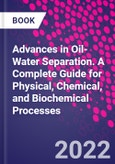Advances in Oil-Water Separation: A Complete Guide for Physical, Chemical, and Biochemical Processes discusses a broad variety of chemical, physical and biochemical processes, including skimming, membrane separation, adsorption, onsite chemical reactions, burning and usage of suitable microbial strains for onsite degradation of oil. It critically reviews all current developments in oil-water separation processes and technologies, identifies gaps and illuminates the scope for future research and development in the field.� This book provides researchers, engineers and environmental professionals working in oil recovery and�storage with solutions for disposal of waste oil and separation of oil from water in a sustainable, environmentally-friendly way.
As the book provides a complete state-of-art overview on oil-water separation technologies, it will also ease literature searches on oil-water separation technologies.
Please Note: This is an On Demand product, delivery may take up to 11 working days after payment has been received.
Table of Contents
Section A: Overview on oil pollution and its effect on environment
1. An overview of oil pollution and oil-spilling incidents
2. Spatio-temporal distribution of Oil spill effect in the estuarine terrain of Bhagirathi-Hooghly river, West Bengal, India
3. Oil pollution and municipal wastewater treatment: issues and impact
4. Overview on worldwide regulations on oil pollution control
5. Technological aspects of different oil and water separation advanced techniques
6. Impact analysis of oil pollution on environment, marine and soil communities
7. Impact of Oil Exploration and Spillage on Marine Environments
Section B: Physical processes
8. Super-hydrophobic polymeric adsorbents as an efficient oil separator
9. Oil Spill Treatment Using Porous Materials
10. Nanotechnological advances for oil spill management: Removal, recovery and remediation
11. Carbon nanotube (CNT) based oil-water separation
12. Nanocoated membrane for oil treatment
Section C: Thermo-chemical processes
13. Chemical Stabilisation of oil by elastomizers
14. Advances in burning processes and their impact to the environment
15. Use of chemical dispersants for management of oil pollution
16. Use of emulsifier as the agent for oil spill mitigation
Section D: Biological processes
17. Use of live microbes for oil degradation in-situ
18. Metagenomics- An Approach for Selection of Oil Degrading Microbes and its Application in Remediation of Oil Pollution
19. Potentiality of Enzymes as a green tool in Degradation of Petroleum Hydrocarbons
20. Bioremediation: an ecofriendly approach for the treatment of oil spills
21. Bioremediation of black tides: Strategies involving genetically modified organisms
22. Microbes and marine oil spills: Oil-eating bugs can cure oily sea-sickness
23. Hybrid biological processes for the treatment of oily wastewater
Section E: Miscellaneous
24. Efficient management of oil waste: Chemical and physiochemical approaches
25. Membrane bioreactors for the treatment of oily wastewater: pros and cons
26. Overview on natural materials for oil water separation
27. Extraction and separation of oils: the journey from distillation to pervaporation
Authors
Papita Das Professor, Department of Chemical Engineering, Jadavpur University, Kolkata, West Bengal, IndiaDirector, School of Advanced Studies in Industrial Pollution Control Engineering, Jadavpur University, Kolkata, West bengal, India. Prof. (Dr) Papita Das is Professor, Department of Chemical Engineering and Director, School of Advanced Studies in Industrial Pollution Control Engineering, Jadavpur University, Kolkata. She has expertise in highly topical domains of chemical engineering related to Environmental Pollution Control. The research done in her laboratory addresses known and emerging environmental concerns that continues to plague us, with an emphasis on clay-based liner materials, nanoparticles, bio-polymeric film for the clean-up of contaminated soil, water, and other environmental compartments. Over the years, her research team has made notable contributions on several key areas related to "Environmental Sustainability�, which have been recognized with various awards in recent years. Further, her research has produced over 175 International Journal publications, 50+ Book Chapters, 12 Books, 2 Edited Books and 100+ Conferences which have been well received by the global scientific community. Suvendu Manna University of Petroleum and Energy Studies, School of Engineering, Dehradun, India. Dr. Suvendu Manna received his PhD in wastewater treatment in 2015. He is an assistant professor in University of Petroleum and Energy Studies, Dehradun, India. Dr. Manna authored or co-authored more than 20 international research and review articles in SCI- and Scopus- indexed journals. He has also written more than 11 book chapters. Jitendra Kumar Pandey Professor at School of Advanced Engineering, University of Petroleum and Energy Studies, Dehradun, India.. Professor Jitendra Kumar Pandey is a professor in University of Petroleum and Energy Studies, Dehradun, India. He completed his PhD in chemistry, and his research interests include materials synthesis, characterizations and their application in energy storage, and water treatment. He has published more than 50 research articles and reviews in peer-reviewed journals.








